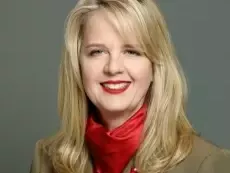- AdventHealth Shawnee Mission

Choose the health content that’s right for you, and get it delivered right in your inbox.
Someone once said that tough times don’t last, but tough people do. In the case of Kansas City’s Kyle Walker, they couldn’t have been more right.
After struggling with what he thought was sports-induced asthma throughout high school, Kyle was diagnosed with a heart valve defect at age 20.
“Kyle was born with a bicuspid aortic valve, which means his valve had only two components (called cusps) instead of the usual three. Less than one and a half percent of the general population has this condition, with some people experiencing valve dysfunction while very young, and others much later in life,” said Thaju Salam, MD, FACC, Cardiologist, AdventHealth.
At the time, Kyle was told he would need to have an artificial valve inserted someday. The hope was that surgery wouldn’t be necessary for as long as 30 years.
In the meantime, he channeled his lifelong passion for sports into running — becoming an accomplished marathoner.
“By age 36, I had completed four marathons, and had just run the Corporate Challenge Half-Marathon,” said Walker.
But that’s when his health took a turn for the worse.
“After taking a week or so off from training, I went out to run. Just a half mile later, I started suffering chest pains. Right away, I knew something wasn’t right,” said Walker.
Kyle’s valve was no longer functioning nearly as well as it needed to. It wouldn’t open fully, so blood flow from the heart to the body was significantly — and dangerously — reduced.
“I needed to have a new valve inserted. And because I wanted to keep running and stay active, the mechanical valve was the best option, even though it meant being on blood thinners for life,” said Walker.
That’s when Kyle and his medical team made the decision to move forward with the procedure.
“Having open heart surgery is one of the biggest surgeries a person can undergo. The heart usually has to be stopped and circulation maintained through a bypass machine,” said Dr. Salam.
Following the successful procedure, Kyle spent the next five days in the ICU at AdventHealth Shawnee Mission before returning home.
“It was tough being in the ICU. But the nurses were all very professional, very kind. If there was anything I needed, they were absolutely there for me,” said Walker.
Then, two weeks into his recovery process, he started having some issues.
“Kyle had a couple of complications after surgery, the first being a fluid build-up in the sac around the heart which had to be drained initially with a needle and then surgically, and the second being an irregular heart rhythm which required a cardioversion (shock) to get him back in rhythm,” said Dr. Salam.
Following the cardioversion, Kyle had a second open heart surgery to remove the blood clots that had formed all around his heart. The recovery process following the second procedure was much more difficult than after the first.
Turning a Setback Into a Comeback
“I got the mechanical valve because I wanted to keep running, keep playing softball, and most of all, be there for my two daughters. Even though I’d gone through two open heart surgeries, I knew I wasn’t done yet,” said Walker.
“An open-heart surgery patient loses muscle mass and becomes deconditioned. So it is beneficial to have a supervised return back to normal activities through a carefully managed exercise program, with incremental increases in exercise,” said Dr. Salam.
Kyle worked with an occupational therapist, and over the course of several weeks, he recovered well enough that she challenged him to walk a mile.
“Well, the next day, I went out and walked three, full miles. It’s just my competitive nature. And I’ve kept moving ever since,” said Walker.
The fact is, Walker has done more than just return to good health.
He’s run five, full marathons postsurgery, including one called the Bataan Memorial Death March in Las Cruces, New Mexico, which Kyle called the most difficult physical challenge he’s ever done.
“I am very proud of Kyle. Earlier last year, he even ran the Boston Marathon. Very few people have done so much despite going through what he did,” said Dr. Salam.
Listen to Kyle's story by watching the video below.
Helping Kyle Go the Distance
To learn more about cardiovascular care at the AdventHealth Heart and Vascular Institute, visit HeartCareKC.com.
Recent News
AdventHealth Medical Group Primary Care at State Line is Health System’s First Practice in Missouri
AdventHealth Cardiologist, Michelle Dew, MD, FACC, sat down with In Kansas City Magazine to discuss some surprising facts related to women's heart health.
Team members are encouraged to join our medical missions trips and we work to Extend the Healing Ministry of Christ.
Separated by only an hour, both AdventHealth Shawnee Mission and AdventHealth South Overland Park rang in the New Year along with other area hospitals with new bundles of joy. Maeve was born at 1:39am...
For the second year in a row, AdventHealth Shawnee Mission earned the highest award a hospital can receive from U.S. News’ Best Hospitals for Maternity Care.
Five APPs recognized as part of the second annual awards program.
The Elekta Unity MRI Linear Accelerator offers the latest cancer-fighting technology, using MRI-Guided Radiation Therapy to pinpoint tumors and avoid healthy tissue.
AdventHealth Shawnee Mission received Get With The Guidelines awards for proven dedication to best practices and life-saving care, and is accredited with 2024 AACVPR Program Certification.
AdventHealth Fertility Center Shawnee Mission is committed to supporting families and expanding access to advanced fertility technologies.
AdventHealth Shawnee Mission Birth Center was voted Best Birth Center by the community in the annual Best of Johnson County awards list.
AdventHealth Shawnee Mission was accredited as a Perinatal Center of Excellence and Baby-Friendly Hospital.
On July 17, leaders from two local entities signed a partnership agreement to address a national crisis in nursing.








